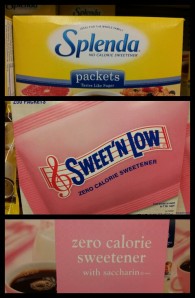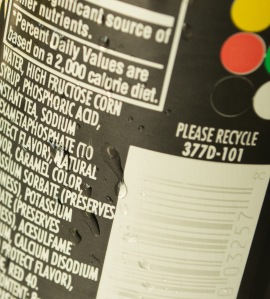Posts Tagged sugar
Artificial Sweeteners – Sucralose (Splenda)
Posted by Jesse Thornton in Nutrition and Health on August 11, 2014
 Artificial sweeteners are sugar substitutes that provide no nutritional value and are made by chemical processes, rather than naturally occurring in the environment. As such, there’s always a lot of negative attention directed toward artificial sweeteners and indeed, anything labeled as “artificial.” I’ve decided to do a series of articles on artificial sweeteners to find out what claims are true and what isn’t, instead of doing one article with a bullet point list. There’s just too much information to condense everything into one article and I like to include as much context as possible because most things are not black and white issues, and this topic is no exception. So the first article in this series will concentrate on what science currently has to say about the most widely used artificial sweetener on the market: sucralose.
Artificial sweeteners are sugar substitutes that provide no nutritional value and are made by chemical processes, rather than naturally occurring in the environment. As such, there’s always a lot of negative attention directed toward artificial sweeteners and indeed, anything labeled as “artificial.” I’ve decided to do a series of articles on artificial sweeteners to find out what claims are true and what isn’t, instead of doing one article with a bullet point list. There’s just too much information to condense everything into one article and I like to include as much context as possible because most things are not black and white issues, and this topic is no exception. So the first article in this series will concentrate on what science currently has to say about the most widely used artificial sweetener on the market: sucralose.
Sucralose (Splenda)
Surcalose, best known as the key ingredient in Splenda, is a non-nutritive sweetener 600 times sweeter than sugar by weight. The molecule itself is produced by a series of chemical reactions, starting with sugar as a base, then, stripping away 3 hydroxyl groups from the original sugar molecule and replacing them with chlorine atoms. The added chlorine atoms make sucralose sweeter than sugar while also preventing it from being metabolized by the body. This means that sucralose is not used as an energy source by the body and is simply eliminated as a waste product. Read the rest of this entry »
High Fructose Corn Syrup is Not Special in the Sugar Debate
Posted by Jesse Thornton in Food myths on May 7, 2014

“I don’t have the time, desire or the need to check every label to see if it contains this one little ingredient.”
High fructose corn syrup (HFCS) has become the latest target in the war against the obesity epidemic. The very fact that it exists because it is a highly processed corn product makes it ripe for sensationalized headlines like “5 Reasons High Fructose Corn Syrup Will Kill You.” The name of the product itself makes it sound ominous. So what is the truth? Will HFCS kill you and, perhaps, more importantly, is it really anymore dangerous than the thing that it commonly replaces, table sugar? The short answer is, no. It is almost exactly the same as regular sugar and is no more harmful than sugar when consumed in amounts that are within or below the recommended dietary guidelines.

Misguided Concerns Over Food Labeling
Posted by Jesse Thornton in Commentary, Nutrition and Health on March 11, 2015
Photo credit: CT Senate Democrats
Earlier this year Oklahoma State University released a summary of the results of an online survey polled from 1000 people in the US that tracks consumer concerns over food safety and regulation. From the polled sample, 82% supported mandatory labeling of food containing genetically modified organisms, or GMOs. A real discredit to those fighting for GMO labeling was the finding that 85% also supported mandatory labeling of food containing DNA. Strikingly, only 39% of respondents were in favor of a tax on sugared sodas, which is an issue that legitimately poses health risks to the US population as I covered in a previous article, and 55% support a ban on transfat, which also poses real health risks. Read the rest of this entry »
Share this:
food, genetically modified food, health, science, Skepticism, sugar
Leave a comment